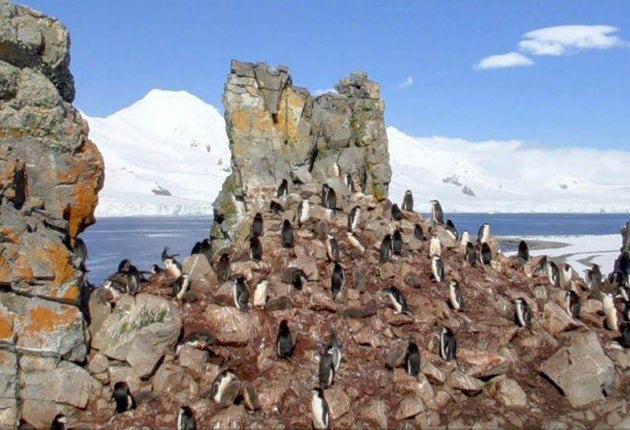Look, there's our nest... Google Street View comes to Antarctica

If Sir David Attenborough and his camera crews weren't already intrusive enough, the seals and penguins of Antarctica now face having their privacy invaded by the billions of internet users, as Google brings its controversial Street View mapping service to the world's southernmost continent.
From today, users of the search engine will be able to access spectacular views of the coastline of Half Moon Island, which is relatively accessible and well-trodden by Antarctic standards, since it provides a popular stopping-off point for cruise ships carrying high-end tourists.
In addition to snow-capped mountains, rocky beaches, and the occasional iceberg, the photographs of the island's Duse Bay contain several images of anorak-wearing visitors who are apparently trying to creep up to the local population of chinstrap penguins to take their own snaps.
They were compiled from 10 shots taken by Brian McClendon, the vice-president of engineering at Google Earth and Maps, which now covers 25 countries on all of the world's continents, and is also this week launching in Ireland and Brazil.
"We often consider Street View to be the last zoom layer on the map," said Mr McClendon. "And a way to show you what a place looks like as if you were there in person, whether you're checking out a coffee shop across town or planning a vacation across the globe."
On the company's blog yesterday, he wrote: "We hope this new imagery will help people in Ireland, Brazil, and even the penguins of Antarctica to navigate nearby, as well as enable people around the world to learn more about these areas."
Google Street View launched in New York, San Francisco, Las Vegas, Denver and Miami in 2007, allowing users of the search engine's map to zoom in on daytime photographs of individual locations or properties, and navigate virtual streets.
Though it has been wildly popular, its global expansion has upset privacy campaigners, who say that its exterior shots of people's homes represent an unwarranted intrusion into their lives. The site has also been accused, in more hysterical media reports, of being a valuable tool for criminals, who can allegedly use it to plan burglaries.
Join our commenting forum
Join thought-provoking conversations, follow other Independent readers and see their replies
Comments
Bookmark popover
Removed from bookmarks